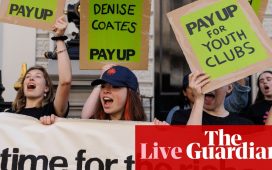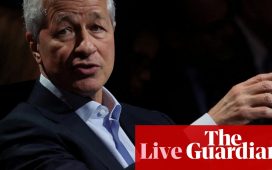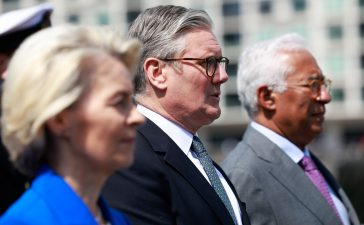Reeves eyes Gulf trade pact as UK government’s ‘next deal’ after EU summit
Rachel Reeves said the UK government is closing in on a trade pact with six Gulf nations, including Qatar and Saudi Arabia, as its next major deal.
The chancellor told the BBC the agreement would be the government’s “next deal” as it looks to boost trade ties following Brexit.
Reeves suggested economic growth would be strengthened through recent trade deals with the United States, the EU and India, all inked within a fortnight.
Britain is in a better place than any other country in the world in terms of deals with those countries.
The first deal and the best deal so far with the US, we’ve got the best deal with the EU for any country outside the EU, and we’ve got the best trade agreement with India.
The chancellor also said the UK was “not looking to have trade negotiations with China”.
In early April, foreign secretary David Lammy said Labour was continuing discussions with the Gulf over a trade deal, which were started by the previous Conservative government.
Reeves’ comments come after a new trade deal with Brussels was struck on Monday.
The Prime Minister hailed his deal, set out at a summit in London, as a “win-win” for both parties, which would be the start of a “new era” in the UK-EU relationship.
The wide-ranging deal will allow more British travellers to use passport e-gates when going on holiday to Europe, while farmers will get swifter, easier access to trade on the continent as a result of an agreement on animal and plant product standards.
A “youth experience scheme” allowing young Britons to study and live in Europe, and a new security and defence partnership were also agreed.
But the deal has been met with criticism after the UK agreed to grant European fishing trawlers a further 12 years’ access to British waters.
Sir Keir Starmer hailed a “mood change” in the relationship with the bloc, saying: “The EU and the UK wanting to work together, all of us prepared to say let yesterday be yesterday, we are looking forward to tomorrow.
We are not going to litigate old arguments, we are going to go forward in the spirit of what we do together, we do better.
Conservative party leader Kemi Badenoch said, however:
This deal will mean Britain becoming a rule-taker, accepting dynamic alignment, giving up fishing rights and paying new money to the EU.
Nobody has lost more than the fishermen.
Key events
Big BT union rejects ‘derisory’ pay offer

Mark Sweney
One of BT’s biggest unions has rejected a “derisory” pay offer that it says would result in almost 30% of its members receiving no rise at all.
Prospect, one of the largest unions representing BT workers, said that 96% of those who voted rejected the offer.
The union, which said the turnout for the vote represented 68% of its BT members, said the telecoms giant’s pay offer worked out at just a 1.28% rise six out of ten managers.
Under the offer 28% of BT managers would not receive any pay rise, while the current rate of inflation stands at 2.6%.
Rachel Curley, deputy general secretary of Prospect, said:
This overwhelming rejection of what is a derisory and insulting pay offer shows the strength of feeling among our members. We have notified the employer of our rejection. It is now time for BT to negotiate a fair award for Prospect members and show more respect for their managers.
Prospect has previously accused BT of targeting older, long-serving staff in its drive to cut jobs.
Reeves backtracks on cash ISA plans
Rachel Reeves has backtracked on plans to reduce the tax-free ISA savings allowance, as she bowed to growing pressure from the City.
The chancellor has confirmed that she will not change the £20,000 annual limit on popular cash ISAs, a move that will benefit millions of savers.
Shell boss plays down reports of BP acquisition
Jillian Ambrose
The boss of Shell has once again played down media reports that the oil major is considering a takeover of its beleaguered rival BP.
Wael Sawan faced shareholders on Tuesday at the company’s annual general meeting where a shareholder questioned the chief executive on the prospects of a Shell-BP takeover.
He said the bar for acquisitions was very high, which was especially true given that Shell’s current share price made it very attractive for the company to continue with its buyback programme.
Sawan was spared from facing trickier questions from protesters who were forced to gather outside the company’s central HQ after Shell decided to hold its AGM in a Heathrow hotel protected by a court injunction against environmental protesters.
Activists from Amnesty International UK, Fossil Free London, and the Justice 4 Nigeria poured fake oil onto a giant map of the Niger Delta, representing the impact of Shell’s activities in the area, while wearing T-shirts reading “Decades of Oil Spills”, “Polluted Waters”, and “Devastated Communities”.
Cranswick to investigate ‘piglet thumping’

Sarah Butler
The UK’s biggest pig meat producer, Cranswick, is to instigate a “fully independent, expert veterinarian review” of its welfare policies and livestock operations across the UK after secretly filmed footage revealed abuse of animals at one of its farms.
Tesco, Sainsbury’s, Asda and Morrisons suspended supplies from Cranswick’s Northmoor farm in Lincolnshire after campaigners released footage of workers grabbing piglets by their hind legs and smashing them on to the hard floor – a banned method of killing known as blunt force trauma or “piglet thumping”.
The campaigners had also recorded evidence of a sow being kicked and beaten with metal bars, as well as a botched killing that left an animal writhing in agony.
Cranswick suspended operations at the farm immediately but said today that it was now carrying out a wider review of its operations which include 400 pig farms as well as poultry facilities. It said:
We have always placed the highest importance on animal health and wellbeing and continuously aim to have the most stringent standards in the sector. We take seriously any instance, anywhere in our supply chain, where behaviour fails to meet those standards.
The company said it had yet to appoint the reviewers but they would be fully independent. The statement was released alongside full year financial results for Cranswick which revealed the group increased sales by almost 5% to £2.7bn while pre-tax profits rose almost 15% to £181.6m.
The number of construction projects started in the UK rose by a third in the past three months, despite a lack of major schemes.
Project starts increased by 33% in the three months to April compared with the previous quarter, according to construction data firm Glenigan.
The number of projects receiving detailed planing consent rose sharply again, by 52% year on year and 51% higher than in the previous three months, because of the approval of the Lower Thames Crossing.
Glenigan’s economic director, Allan Wilen, said:
The results are superficially impressive, but a closer look reveals a sector still struggling to reestablish its foothold. It’s hardly surprising. UK construction is continuing to adjust to mercurial market conditions, sometimes having to respond in the moment to the constantly shifting international and domestic economic landscape. Particularly, higher operational costs, likely to keep rising in the near future, mean clients are delaying investment decisions. Likewise, contractors are lukewarm to putting shovels in the ground right now when funding is not forthcoming.
There’s no denying US tariff policy has definitely exacerbated the uncertainty. However, steps to de-escalate trade tensions may go some way to improving the current situation, with steps like the US-UK tariff deal going some way to improving confidence over the coming months. Furthermore, the government clearly setting out its strategic store will also help to boost momentum as more promised public works are greenlit.
Company insolvencies down in England & Wales but climate remains tough
Fewer companies went out of business in England and Wales last month than a year earlier, according to official figures.
The Insolvency Service said 2,053 companies were declared insolvent in April, 5% lower than in April last year, but 3% higher than in March 2025.
Company insolvencies over the past 12 months have been slightly lower than in 2023, when the annual number hit a 30-year high, but have remained high compared to historical levels.
In April, there were 379 compulsory liquidations – the highest monthly number since September 2014 – 1,544 creditors’ voluntary liquidations (CVLs), 105 administrations, 24 company voluntary arrangements (CVAs) and one receivership appointment.
The number of CVLs was similar to both March and the 2024 monthly average. Administrations were lower than in March, while CVAs were higher.
One in 190 companies on the Companies House register entered insolvency between 1 May 2024 and 30 April 2025, a rate of 52.5 per 10,000 companies. This was down from the 57.0 per 10,000 companies that entered insolvency in the 12 months ending 30 April 2024.
While the insolvency rate has increased since the lows seen in 2020 and 2021, it remains much lower than the peak of 113.1 per 10,000 companies seen during the 2008-09 financial crisis and recession. This is because the number of companies on the effective register has more than doubled over this period.
Jo Hewitt, a senior managing director in the corporate finance & restructuring segment at FTI Consulting, said:
The number of compulsory liquidations was 24% higher than March 2025, and remained significantly higher than the 2024 monthly average, suggesting that the climate remains challenging for businesses.
Whilst corporate insolvency rates showed a slight increase of 3% compared to March 2025, it is too early to tell if businesses in England and Wales will be resilient to the recent market volatility and tariff uncertainty as the full impact on companies and their supply chains will take a while to play out. Although this month’s interest rate cut may provide a welcome reprieve for over leveraged borrowers, we anticipate that external headwinds, such the rise in employer’s National Insurance Contributions and falling oil prices, together with the continued geopolitical uncertainty will drive financial distress in certain sectors over the coming months.
European stock markets are pushing cautiously higher, following modest gains in Asia.
The UK’s FTSE 100 index has advanced 45 points to 8,745, a 0.5% gain, while Germany’s Dax is 0.25% ahead, France’s CAC edged up 0.1% and Italy’s FTSE MiB added nearly 0.5%.
Oil prices have fallen slightly, with Brent crude down by 0.26% to $65.37 a barrel. In currency markets, sterling has gained 0.1% to $1.3373 against the dollar.
The dollar is generally on the backfoot amid ongoing concerns over the US economy, and has lost 0.2% against a basket of major currencies.
JP Morgan’s chief executive, Jamie Dimon, warned last night that investors were being too complacent as markets shook off news that the US has lost its last triple-A credit rating amid fresh concern over the federal government’s burgeoning debt pile.
Credit ratings agency Moody’s dealt a blow to Washington on Friday when it stripped the US of its top-notch rating, downgrading the world’s largest economy by one notch to AA1 and become becoming the last of the big three agencies to drop its triple-A rating for the US.
The announcement unnerved markets on Monday morning, but stock markets had recovered by the end of the day.
Speaking at JP Morgan’s annual investor day meeting in New York, Dimon warned against complacency. “We have huge deficits; we have what I consider almost complacent central banks. You all think they can manage all this. I don’t think [they can],” he said.
Dimon said he saw an “extraordinary amount of complacency” and added that he believes the possibility of stagflation – a recession with rising prices – was far higher than investors believe.
Moody’s downgrade came as Donald Trump struggles to push his “big, beautiful” tax and spending bill through Congress, Moody’s said it expected the US budget deficit to keep rising.
Australia’s central bank governor warns global economy is ‘complete rollercoaster’
More on Australia’s interest rate cut, the second reduction this year – partly designed to protect indebted households from Trump’s tariffs, which have spooked consumers and businesses, and created the potential for a protracted trade war.
The Reserve Bank of Australia’s governor, Michele Bullock, said inflation was coming down, and the jobs market was robust, but characterised the global backdrop as a “complete rollercoaster”.
Post Office data leak: hundreds of Horizon victims offered up to £5,000 compensation
Hundreds of former post office operators will be compensated by the Post Office after it accidentally leaked their names and addresses last June.
The Post Office has confirmed that individual payouts will be capped at £5,000, although higher claims may still be pursued.
It comes almost a year after 555 victims of the Horizon IT scandal had their personal details published on the Post Office’s corporate website.
The Post Office said victims would receive £5,000 or £3,500 depending on whether the address published was current.
In a statement, it said:
We have written to all named individuals either directly, or via their solicitors.
If there are any individuals whose name was impacted by last year’s breach, but who have not received information about the payment for some reason, they can contact us or ask their solicitors if they have legal representation.
The law firm Freeths said that 348 clients, out of the total 420 it represented, who had their data breached had already received payment. Freeths said it had been told most of those affected would receive a “significant interim compensation payment”.
Here’s our full story on Greggs.
Sales at Greggs have picked up after the UK’s biggest bakery chain branched out into iced drinks, pizza boxes and a macaroni cheese that has gone viral on social media.
The bakery, which is headquartered in Newcastle upon Tyne, reported a 2.9% rise in comparable sales in the first 20 weeks of the year.
New beverages and food on the shelves helped step up sales growth, including a new peach iced tea, mint lemonade, and a mac and cheese that has amassed thousands of views on TikTok.
Shares in Greggs rallied in early trading on Tuesday, up by as much as 7%. However, the stock has suffered this year, losing about a quarter of its value since January, amid broader concerns around slowing sales growth.
Responding to the protests, a Shell spokesperson said the oil spills in the Niger Delta were being cleaned up.
These are important issues and we respect the right of people to express their view. But for many years the vast majority of spills in the Niger Delta have been caused by third parties acting unlawfully, such as oil thieves who drill holes in pipelines, or saboteurs.
These challenges are managed by a joint venture which Shell’s former Nigerian subsidiary, SPDC, operated, cleaning up every spill from the joint venture’s facilities.
Back to Shell’s annual meeting, and the protests over the Niger Delta outside its headquarters.
A Shell spokesperson said:
We agree that society urgently needs to take action on climate change. We are reducing our emissions, helping customers reduce theirs, and investing in the low-carbon energy system of the future.
In the last two years, this has totalled $8bn in the development of solutions including electric vehicle charging, low-carbon fuels, renewable power generation, hydrogen, and carbon capture and storage. Added to previous investments, that’s $20bn in lower carbon options.
But as the world continues to use oil and gas to heat homes, deliver goods and transport people, we must also carry on investing in the secure and affordable energy the world needs today.
The company has built Holland Hydrogen, slated to be one of Europe’s largest green hydrogen plants; bought Nature Energy, Europe’s biggest biogas producer, for $2bn; and invested in the Northern Lights joint venture in Norway for CO2 transport and storage.
However, according to Dutch media, Shell’s €1bn Holland Hydrogen I project has been plagued by financial concerns, shifting regulations, and an uncertain market – and may never open.
Shell’s response did not address activists’ concerns over the environmental damage in the Niger Delta. They say oil spills and leaks have devastated the health and livelihoods of many of the 30 million people living in the area.
Bank of England’s Pill says pace of rate cuts ‘too rapid’
Bank of England Chief Economist Huw Pill said the quarterly pace of interest rate cuts had been “too rapid” given the inflation outlook, but added that the path for interest rates remained “downward”.
The central bank lowered interest rates by a quarter point to 4.25% to cushion the UK economy against the impact of rising economic uncertainty.
Giving a speech entitled The courage not to act at a briefing hosted by Barclays, he said he thought the pace of rate cuts since mid-2024 had been “too rapid given the balance of risks to price stability we face”.
This is in line with his preference for “cautious and gradual” cuts in Bank Rate expressed over the past 12 months, he said.
I would therefore characterise my dissenting vote [in May] as favouring a ‘skip’ in the quarterly pattern of Bank Rate cuts intended to slow the pace at which monetary restriction is withdrawn. It should not be seen as favouring a halt to (still less a reversal of) that withdrawal of restriction.
I believe that the underlying disinflation process remains intact and – conditional, as always, on the information and analysis available today – that the prospective path of Bank Rate from here is downward.
Shell faces protests calling for clean-up in Niger Delta
Shell is holding its annual meeting today, and faces protests from activists calling for a full clean-up of the damage caused in the Niger Delta.
Activists from Amnesty International UK, Fossil Free London, and the Justice 4 Nigeria coalition are staging a protest outside Shell’s global headquarters in London, just hours before the oil giant holds its AGM at a hotel in Heathrow where protests are barred by a court injunction. The meeting is due to start at 10am.
The campaigners say:
For nearly 70 years Shell’s oil spills and leaks – arising from poorly maintained pipelines and wells and inadequate clean-up efforts – have devastated the health and livelihoods of many of the 30 million people living in the Niger Delta. The pollution has contaminated water sources, killed fish and crops, destroyed mangrove forests, and caused serious health issues, including respiratory illnesses, increased rates of miscarriage and infant mortality.
According to research, babies born to women who lived near oil spills before pregnancy are twice as likely to die in their first month than elsewhere in the country.
Despite making billions in profits, Shell has consistently failed to adequately clean up or compensate affected communities. From just one area – Ogoniland – the Movement for the Survival of the Ogoni People estimates Shell earned $30bn over 30 years, while ruining local lives and livelihoods.
Peter Frankental, Amnesty International UK’s business and human rights director, added:
Despite numerous court rulings ordering Shell to clean up and compensate the people it has harmed, the company continues to drag its feet. Shell has made huge profits at the expense of the Niger Delta’s people without taking any responsibility, it must now be held accountable.
For decades communities have demanded justice and the right to live in a safe, healthy environment. Shell has created a living hell in the Niger Delta – now it must clean up and pay up.
Dominic Twomey from Amnesty International said on X:
On the day of oil company Shell’s AGM 2025, activists join together outside Shell’s HQ in London to call for a full clean up of the environmental damage caused in the Niger Delta. pic.twitter.com/idjub86T79
— Dominic Twomey (@Dom_Twomey) May 20, 2025
Shell has been contacted for comment.
More on Britain’s biggest bakery chain Greggs, whose trading has improved in recent weeks. The share price jumped by 7%.
John Moore, senior investment manager at RBC Brewin Dolphin, said:
Greggs has been going through a tougher period recently, with the shares down around -30% in the year to date. Recent price increases of around 2% suggest the company is trying to right-size in the aftermath of the National Insurance increases, recalibrating its roll out and growth ambitions.
There are tentative signs that Greggs is making progress in today’s update, with sales continuing to rise, the shop portfolio growing, and expectations for the year unchanged. Slowing growth will still be a concern, as well as the wider question about whether we have reached ‘peak Greggs’ in the UK. Nevertheless, the baker is a resilient and innovative business that has proven its ability to bounce back from tricky times.
Richard Hunter, head of markets at the trading platform interactive investor, said Vodafone is “beginning to ring the changes”.
Shares in the FTSE 100 company rose by less than 1%, despite a €4bn share buyback.
Turning around a super tanker is never an easy task, especially when the company is in the midst of a highly competitive arena, but there are some signs that Vodafone is beginning to ring the changes.
The group had quite simply been fighting fires on too many fronts while dealing with an increasingly onerous debt burden, leading to the need for a significant transformation. What should now emerge from the turnaround is a smaller and less geographically diverse, but more focused operation…
One particular area of promise is the Africa operation, which now accounts for 20% of group income. Service revenue grew by 11.3% over the year, with the group well positioned to benefit further from some potentially explosive growth in the region, particularly given the more widespread availability and use of the services which the industry provides, and of which Vodafone is an established player.
Turning to the UK and Germany, he said:
The UK business is another region which the group is aiming to strengthen, and its planned mega-merger with Three UK should complete imminently. The merger should truly change the domestic landscape, while also providing new revenue opportunities at scale as well as cost synergy savings of around £700 million per year on completion. In the meantime, the unit accounts for 19% of group income and saw total revenue growth of 1.9% for the period.
The most obvious thorn in the group’s size remains the German operation, which is the group’s largest and accounts for 35% of overall service revenue, which declined by 5% for the year. The unit is still suffering from customer losses which were largely attributable to enforced price increases last year, competitive activity elsewhere and the lingering effects of the change to German TV law which resulted in a recontracting of customers, where the previous number of 8.5 million has been reduced to 4.2 million households.
More broadly, the telecoms sector is one which is of course based on reliability, but equally importantly on price, where there remains ferocious competition. Recent years have also required huge investment as the industry moves on, such as being part of the new 5G network, with the benefit of any payback not being felt for any number of years. This becomes especially pertinent when margin protection tends to come with sheer volumes as opposed to the ability to raise prices indiscriminately.
Reeves eyes Gulf trade pact as UK government’s ‘next deal’ after EU summit
Rachel Reeves said the UK government is closing in on a trade pact with six Gulf nations, including Qatar and Saudi Arabia, as its next major deal.
The chancellor told the BBC the agreement would be the government’s “next deal” as it looks to boost trade ties following Brexit.
Reeves suggested economic growth would be strengthened through recent trade deals with the United States, the EU and India, all inked within a fortnight.
Britain is in a better place than any other country in the world in terms of deals with those countries.
The first deal and the best deal so far with the US, we’ve got the best deal with the EU for any country outside the EU, and we’ve got the best trade agreement with India.
The chancellor also said the UK was “not looking to have trade negotiations with China”.
In early April, foreign secretary David Lammy said Labour was continuing discussions with the Gulf over a trade deal, which were started by the previous Conservative government.
Reeves’ comments come after a new trade deal with Brussels was struck on Monday.
The Prime Minister hailed his deal, set out at a summit in London, as a “win-win” for both parties, which would be the start of a “new era” in the UK-EU relationship.
The wide-ranging deal will allow more British travellers to use passport e-gates when going on holiday to Europe, while farmers will get swifter, easier access to trade on the continent as a result of an agreement on animal and plant product standards.
A “youth experience scheme” allowing young Britons to study and live in Europe, and a new security and defence partnership were also agreed.
But the deal has been met with criticism after the UK agreed to grant European fishing trawlers a further 12 years’ access to British waters.
Sir Keir Starmer hailed a “mood change” in the relationship with the bloc, saying: “The EU and the UK wanting to work together, all of us prepared to say let yesterday be yesterday, we are looking forward to tomorrow.
We are not going to litigate old arguments, we are going to go forward in the spirit of what we do together, we do better.
Conservative party leader Kemi Badenoch said, however:
This deal will mean Britain becoming a rule-taker, accepting dynamic alignment, giving up fishing rights and paying new money to the EU.
Nobody has lost more than the fishermen.
Vodafone slumps to loss after writedowns
Vodafone has fallen into the red after taking a €4.5bn hit from writedowns on its businesses in Germany and Romania, but said it expected to return to top-line growth in Germany, its biggest market.
The mobile phone giant made a pre-tax loss of €1.5bn in the year to 31 March, against a profit of €1.6bn the previous year. It took impairment charges of €4.4bn on its struggling German division and €165m on its Romanian business. Revenues rose by 2% to €37.5bn.
Chief executive Margherita Della Valle was upbeat, though.
We have reshaped Europe, we are seeing the positive impact of our drive for customer satisfaction in all our markets – most noticeably in the UK and Germany – and we have delivered strong operational improvements across the business. Clearly there is much more to do, but this period of transition has repositioned Vodafone for multi-year growth.
Looking ahead, we expect to see broad-based momentum across Europe and Africa, and for Germany to return to top-line growth during this year. This is reflected in our guidance for profit and cash flow growth for the year ahead.
Introduction: China and Australia cut interest rates; Greggs sales improve as Mac and Cheese goes viral
Good morning, and welcome to our rolling coverage of business, the financial markets and the world economy.
China’s and Australia’s central banks have both cut interest rates to stimulate their economies and cushion the impact of US trade tariffs.
China cut its benchmark lending rates for the first time since October, following Beijing’s sweeping monetary easing measures. The People’s Bank of China reduced the one-year loan prime rate by 10 basis points to 3.0%, and the five-year loan prime rate was cut by the same amount to 3.5%.
The lending rate cut was announced just after five of China‘s biggest state-owned banks trimmed their deposit interest rates. Industrial and Commercial Bank of China, Agricultural Bank of China, China Construction Bank and Bank of China reduced their deposit rates by 5-25bps.
Global investment banks have upped their forecasts for China’s economic growth this year, after Beijing and Washington agreed to a 90-day pause on tariffs, despite ongoing uncertainty around the trade negotiations.
China’s president Xi Jinping called for continuous efforts to build a stronger manufacturing industry, the official Xinhua news agency reported. Xi stressed the need for the country to be self-reliant and to master key technologies, as he visited a bearings manufacturer in China’s central Henan province.
Marco Sun, chief financial market analyst at MUFG Bank, said the rate cuts were aimed at boosting credit lending and stimulating consumption.
The central bank is likely to switch to a wait-and-see approach in coming months unless external geopolitical risks deteriorate enough to extinguish hopes that the economy can stabilise.
The Shanghai and Shenzhen exchanges rose by 0.4% and 0.8%, while the Australian stock market advanced by 0.6% and Japan’s Nikkei was little changed.
The Reserve Bank of Australia cut its cash rate by 25bps to a two-year low of 3.85% at its May meeting, the first rate cut since January. The Australian dollar fell after the decision was announced. The central bank said:
Inflation is in the target band and upside risks appear to have diminished as international developments are expected to weigh on the economy.
The board assesses that this move will make monetary policy somewhat less restrictive. It nevertheless remains cautious about the outlook.
Britain’s biggest bakery chain Greggs said sales growth picked up in the past five months, as its newly launched Mac and Cheese went viral on TikTok.
The company, famous for its sausage rolls and vegan alternatives, said like-for-like sales (at outlets open at least a year) rose by 2.9% in the first 20 weeks of 2025. In the first nine weeks sales had disappointed with a 1.9% rise, its worst performance since the pandemic, for which it blamed bad weather and a tough macroeconomic backdrop.
After an initial trial last year, its made-to-order range, including chicken burgers, wraps and fish finger sandwiches is now sold in more than 300 shops across the country.
Greggs opened 66 new shops, which means it now has 2,638 outlets, as it aims to launch up to 150 over the year.
The Agenda






